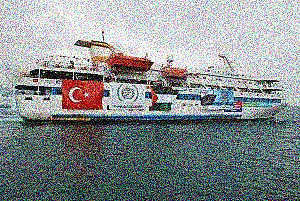The Mavi Marmara.
In a gesture that could only chill Turkish-Israeli relations that much further, Turkish prime minister, Recep Tayyip Erdogan, recently stated that Turkey’s naval forces would escort Turkish humanitarian aid ships bound for the Gaza Strip. This comes following Israel’s refusal to apologize for its deadly raid on an aid flotilla heading to the besieged Palestinian territory in May 2010.
Erdogan went on to say that Turkey would closely monitor international waters and has taken steps to prevent what he called ‘Israel’s unilateral exploitation of natural resources’ in the eastern Mediterranean Sea. Shortly thereafter, Turkey opposed a move for NATO to open an office in Israel.
Such statements are an indication of the extent to which Turkish-Israeli relations have deteriorated in the past year and more, of the fraying of a number of important regional strategic alliances that Israel has long enjoyed. Turkish-Israeli tensions also tend to undermine the U.S. strategic position in the Middle East, which has long been dependent on the cooperation of such key players as Turkey and Israel. The implications of U.S. concern about Israel’s regional isolation were brought sharply into focus during Secretary of Defense, Leon Panetta’s recent visit to Israel.
Speaking specifically of Israel-Turkish (as well as Israeli-Egyptian) strains, Panetta is quoted as saying:
“It’s pretty clear, at this dramatic time in the Middle East when there have been so many changes, that it is not a good situation for Israel to become increasingly isolated. And that is what has happened…”
Panetta said he was aware of that Israel had more and better weapons than its neighbors… “but the question you have to ask is – is it enough to maintain an military edge if you are isolating yourself diplomatically?”
As predicted by many of those following events in the Middle East, September turned out to be nothing short of a political tsunami for the Israeli leaders and consequently, for the United States as well. The deterioration of Turkish-Israeli relations, the Egyptian call to renegotiate 1979 Camp David Accord, the Palestinian push for a resolution on statehood from the UN, the mass demonstrations in Israel over socio-economic conditions – all these events, coming one atop the other, have left the Israeli administration twisting in the wind.
As the momentum of the Second Arab Revolt picked up and became region-wide, the confusion of Israel’s ruling circles deepened. Not long before, Tizpi Livni, the country’s foreign minister, spoke of her country’s both regional and international status in harsh terms, speaking of nothing short of Israel’s crisis of legitimacy.
In the series that follows we will explore the major shifts that have occurred since that day in December 2011, less than a year ago, when a young and impoverished and humiliated, unlicensed Tunisian street peddler in Sidi Bouzid, Tunisia, immolated himself in the town square there, setting off a regional explosion which has not yet abated.
The Palmer Report
After having a strong and cordial political relations for decades, Turkish-Israeli relations hit the lowest level few weeks ago, after a UN report on the deadly Israeli raid on a Gaza-bound aid ship, known today as the Palmer Report, claimed that Israel’s naval blockade of Gaza was legitimate but its raid on the flotilla trying to break the blockade was “excessive and unreasonable.”
The UN report was published after Ban Ki Moon, UN Secretary General, decided to investigate the events of May 31, 2010 where Israeli commandos boarded the Mavi Marmara, and five other ships carrying humanitarian aid to the beleaguered people of Gaza, and killed nine people – eight Turks and one US citizen of Turkish origin – in international waters, approximately 70 miles from the blockade zone, causing a diplomatic row between Turkey and Israel.
The investigation team was headed by Sir Geoffrey Palmer, a former prime minister of New Zealand, aided by Alvaro Uribe, the former Colombian president, along with a representative each from Israel and Turkey.
The report was charged with interpreting the legal issues involved reasonably and responsibly. It did not appear to have done so. The central issues were the blockade of Gaza and whether a country has the right to attack a ship registered under another flag, over 70 miles from the shore.
Unfortunately neither of the two issues was addressed. Although other international bodies had already condemned Israel for its illegal siege of Gaza, this report saw fit to call it legal.
The second central issue was again conveniently ignored and Israel was simply condemned for harsh and disproportional reaction. Under what appears to have been pressure from US, the UN stacked the committee in a manner that not only discredited its founding; it did not want those issues to be addressed.
The key point involved is that the underlying the Israeli-Egyptian blockade imposed more than four years ago on the 1.6 million Palestinians living in Gaza is, according to international law, unlawful and should be immediately lifted. It follows that the Israeli attack to enforce the blockade was unlawful, an offense aggravated by its gross interference with freedom of navigation on the high seas, and further aggravated by resulting in the deaths of nine humanitarian workers and peace activists on the Mavi Marmara.
Israel’s Arab Spring.
Such conclusions should have been “no-brainers” for the panel, so obvious were these determinations from the perspective of international law. Instead, with pressure from Washington guiding the investigation, the result was, not surprisingly, essentially a whitewash which not only in principle justifies the Israeli attack but also gives credence to the broader issue: giving credence to the notion that the blockade of Gaza itself is justified by international law.
Not surprisingly, Turkey responded strongly that it was not prepared to live with 105-page report’s central finding which found that the Israeli blockade of the Gaza Strip is lawful and could legally be enforced by Israel against a humanitarian mission, even in international waters.
Given the make-up of the panel issuing the report, perhaps this outcome should not be surprising. It gives all the indications of having been ‘stacked’ and, as such, was woefully ill-equipped to render an authoritative result.
- Former New Zealand Prime Minister and environmental law professor Geoffrey Palmer, the chair of the panel lacked expertise concerning either international maritime law or the law of war.
- Incredibly, the only other independent member of the panel was Alvaro Uribe, the former President of Colombia. Uribe has no professional credentials related to the issues under consideration.
- The remaining two members were designated by the governments of Israel and Turkey. Not surprisingly, they appended partisan dissents to those portions of the report that criticized the position taken by their respective governments.
Uribe is well known if not notorious both for his awful human rights record while holding office and for having forged intimate ties with Israel through arms purchases and diplomatic cooperation. The fact that he received “The Light Unto The Nations” award from the American Jewish Committee should have been sufficient in itself to cast doubt on his suitability.Alvaro Uribe’s presence alone on the panel compromised the integrity of the process, and made one wonder how such an appointment could be explained, let alone justified.
Another limitation of the report was that the panel was constrained by its terms of reference, which prohibited reliance on any materials other than that presented in the two national reports submitted by the contending governments.
With these considerations in mind, we can only wonder why the Secretary General would have established a framework so ill-equipped to reach findings that would put the controversy to rest, which it has certainly not done. Such a conclusion contradicted the earlier finding of a more expert panel established by the Human Rights Council, and also rejected the overwhelming consensus that had been expressed by qualified international law specialists on these core issues.
No Closure
Although the panel delayed the report several times to give diplomacy a chance to resolve the contested issues, Israel and Turkey could never reach closure. There were intriguing reports along the way that unpublicized discussions between representatives of the two governments had reached a compromise agreement on the basis of Israel’s readiness to offer Turkey a formal apology and to compensate the families of those killed as well as those wounded during the attack.
But when the time came to announce such a compromise, Israel backed away. Israeli Prime Minister Binyamin Netanyahu seemed particularly unwilling to take the last step, claiming that it would demoralize the citizenry of Israel and signal weakness to Israel’s enemies in the region. More cynical observers believed that the Israeli refusal to resolve the conflict was a reflection of domestic politics, especially Netanyahu’s rivalry with the extremist Foreign Minister Lieberman, who continuously accuses Netanyahu of being a wimpy leader and does not hide his own ambition to be the next Israeli head of state.
Whatever the true mix of reasons, the diplomatic track failed, despite cheerleading from Washington that made no secret of its view that resolving this conflict had become a high priority for American foreign policy. And so the Palmer Report assumed a greater role than might have been anticipated. After the feverish diplomatic efforts failed, the Palmer panel seemed to offer the last chance for the parties to reach a mutually satisfactory resolution based on the application of international law and resulting recommendations.
So Where to Next?
We believe the time has come for Israel to pay a price for its persistent violation of International Law. Until now, Israel has managed, with the full support of the US, to avoid paying any price for defying international law.
- For decades it has been building unlawful settlements in occupied West Bank and East Jerusalem.
- It has used excessive violence on numerous occasions in dealing with Palestinian resistance.
- It has subjected the people of Gaza to sustained and extreme forms of collective punishment.
- It attacked Lebanese villages and Beirut neighborhoods mercilessly in 2006, launched a massive campaign against a defenseless Gaza at the end of 2008, and then shocked world opinion with its violence against the Mavi Marmara during its nighttime attack in 2010.
If Turkey sustains its position, it will finally send a message to Tel Aviv that the well-being and security of Israel in the future will depend on a change of course in its relations with both the Palestinians and its regional neighbors. For Israel, the days of flaunting international law and fundamental human rights are no longer policy options without a downside. Turkey is dramatically demonstrating that there can be a decided downside to Israeli lawlessness.
Ibrahim Kazerooni is completing a joint PhD program at the Iliff School for Theology and the University of Denver’s Korbel School of International Studies in Denver. Rob Prince is a lecturer in International Studies at the University of Denver’s Korbel School of International Studies; for the past seven years he has published a blog, The Colorado Progressive Jewish News.